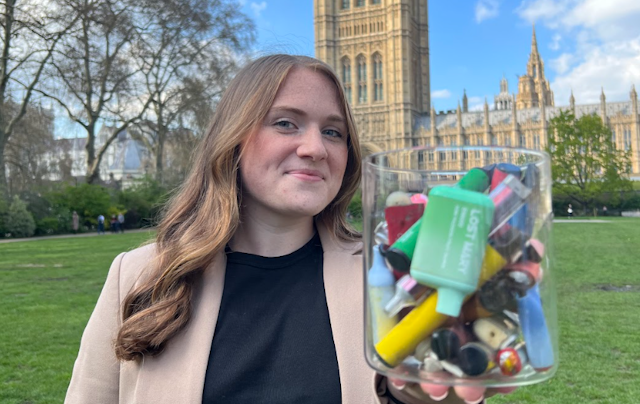On a wet day in January 2023, I took Scottish Labour MSP, Mercedes Villalba, on a vape hunt. Having seen some of the vape litter picking videos I had made which went viral, she asked to come along and see the problem for herself. Armed with bin bags and litter pickers, we set off around the University of Dundee campus in search of discarded disposable vapes.
Within an hour, we collected dozens of these electronic devices. This experience spurred Villalba on to act. She asked questions in parliament questions, attended events and spoke at debates alongside other parliamentarians who had similar concerns about the harmful environmental impacts of single-use vapes.
A year since that vape hunt, we’ve reached a milestone. This week, after considerable efforts, the UK government announced plans to ban disposable vapes. Community engagement, including my vape hunt litter picks, and grassroots action have played a crucial role in driving this change.
Community is key
My PhD at Abertay University and the University of Dundee investigates the links between climate resilience, nature-based solutions, and community engagement. My research has been running in parallel with the vape campaign, and I’ve had firsthand experience of the importance of local voices and community action.
Local communities notice the damage caused by disposable vapes, whether that’s nicotine-addicted schoolchildren struggling to concentrate through school lessons, waste workers dealing with increased fires due to explosive lithium-ion batteries inside vapes, or trading standards officers feeling overwhelmed by the sheer number of shops flouting the rules selling illegally to kids.
Communities also know which solutions could be the best fit for them, so taking the time to build connections with local representatives really makes a difference. Collaboration with local community groups to find solutions is beginning to catch on after recent research has shown that multiple benefits are possible when working together.
Projects, including UrbanByNature working with local community groups such as Growchapel in Glasgow or CleverCities in Neugraben-Fischbek, Hamburg, facilitate collaboration between communities, researchers, local authorities, charities and practitioners to work together shaping cities and towns into more resilient places, tackling urban challenges and transforming neighbourhoods.
Local people get to shape the places they call home while building resilience and creating spaces that enhance wellbeing too. That includes green corridors, roofs, rain gardens, school wildflower meadows and community allotment projects.
Waking up to e-waste
I first noticed disposable vapes littering the natural environment while walking my dog around our local park in the south side of Glasgow in September 2022. As a climate change activist, I couldn’t sit back and do nothing. I tweeted in frustration, saying that I was sick of finding these as litter, and wanted to campaign against these for both public health and environmental reasons.
That frustration led to the launch of the #BanDisposableVapes social media awareness campaign, then 16 months later, a proposed legislative change. The engagement of so many decision-makers at every level of government has definitely been a major contributor to the success of the movement to ban disposable vapes.
In May 2023, I spent a Thursday evening emailing every single councillor in Scotland about the need to ban disposable vapes. I had no idea what the response would be, but what transpired was so encouraging. After drafting personalised emails to each local authority, outlining the problems, research and solutions, with local case studies where possible, 29 out of 32 councils took this issue to their meetings. Remarkably, different political parties proposed change, agreed to support the campaign to ban disposable vapes and wrote to the Scottish government demanding improved legislation.
Grassroots innovation
Throughout this campaign, I’ve seen countless examples of successful grassroots action. Litter picking groups across the UK have contacted their local MPs. Parents and teachers have united to discuss solutions to youth vaping. Youth groups including the Eco Youth Club in Scalloway, Shetland have voiced their concerns to their councillors.
Local communities have more power than we often realise. Yes, we need businesses and governments to shift the system, but individuals have significant influence too. Businesses look at our consumer behaviours and change their products to meet the next trend. Our demands can push businesses to improve their corporate responsibility. Meanwhile, governments endeavour to secure a tick on our next ballot paper to secure our vote. We can help set the agenda and insist that our government sets legislation that protects our planet and our community.
When the UK government released the Creating a smokefree generation and tackling youth vaping consultation at the end of 2023, organisations, experts and people in local communities could really have their say. There was a huge response. Most (27.025) of the 27,921 responses came from individuals concerned about health impacts of vaping, underage access and environmental issues. Crucially, 69% respondents were in favour of a ban, and decision makers have listened and acted.
There’s still more work to be done. We have about a year to build robust legislation, address the problems of disposable vapes and consider any potential unintended consequences.
But right now, I’m taking a moment to celebrate the success of a truly community-centered campaign that has brought together people from across different sectors, political parties, and nations to take direct action that protects our environment and the next generation.

Don’t have time to read about climate change as much as you’d like?
Get a weekly roundup in your inbox instead. Every Wednesday, The Conversation’s environment editor writes Imagine, a short email that goes a little deeper into just one climate issue. Join the 30,000+ readers who’ve subscribed so far.

